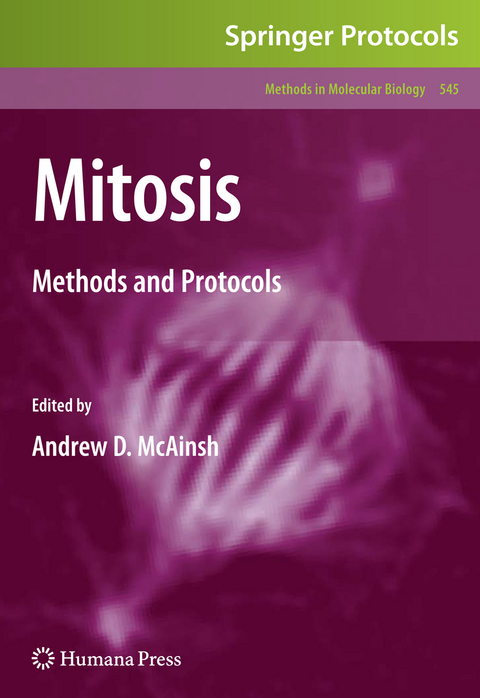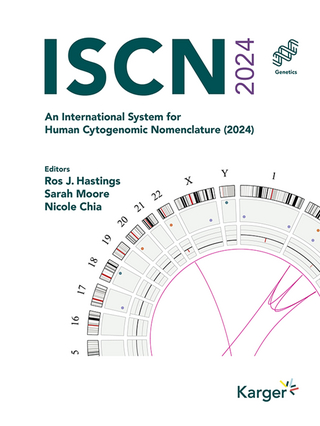Mitosis
Humana Press Inc. (Verlag)
978-1-60327-992-5 (ISBN)
Mitosis is a dynamic and stochastic process that has evolved to accurately segregate the geneticmaterialintotwodaughtercells,therebypreventinggenomicinstabilityandthe developmentofdisease. Mitosisisaphenomenallycomplicatedprocessthatinvolvesh- dreds,ifnotthousands,ofproteincomponentsandregulatorystepsthatoperateinboth spaceandtimetodrivecelldivision. Modernmethodsmakeitpossibletoaskformechan- ticprinciplesunderlyingthisbewilderingcomplexity. Themainpurposeofthisvolumeis toprovideanup-to-datecollectionofmethodsandapproachesthatareusedtoinvestigate themechanismofmitosisatthemolecularlevel. Whilemanyofthesemethodsarefocused onmammaliancells,wehave,whereappropriate,includedchaptersusingmodelorg- isms. We hope to capture both current approaches and the future direction of method development,withcontributionsfrombothestablishedresearchersandemergingyoung scientists. Thisbookisdesignedwithtwogeneralgroupsofreadersinmind:First,graduates- dentsandpostdoctoralresearcherswhoarebeginningworkforthe?rsttimeinamitosis laboratory. Second,researcherswhoarealreadyworkinginthemitosis?eldwhorequire a resource for both established and newly developed methodologies.
To achieve this, the organization of this book developed into three general areas: First, we cover me- ods that can be used to inactivate your gene of interest, or deplete proteins of interest (chapters1-3). Second,welearnaboutspeci?cbiochemicalandmicroscope-basedme- ods (chapters 4-9). Third, we discover approaches to monitor and measure key mitotic processes(chapters9-20). Giventhecomplexitiesofmitosis,itseemshighlyprobablethat suchacombinationofimaging,biochemicalandgeneticmethodologieswillbecrucialto ourfutureunderstandingofmitoticregulation. I would like to thank all of the authors for their enthusiasm and effort in putting togetherthissetofmethods,aswellasallthemembersofmylaboratoryforproofreading and correcting the chapters and especially Sarah McClelland who read all the chapters atleasttwiceatvariousstages. Finally,IwishtothankLyndyRasmusenforherhelpin administeringtheprojectandkeepingmeorganized. Andrew D. McAinsh v Contents Preface...v Contributors...ix 1 Knock-inandKnock-out:TheUseofReverseGeneticsinSomatic CellstoDissectMitoticPathways ...1 AlexisR. Barr, DeborahZyssandFanniGergely 2 FunctionalDissectionofMitoticRegulatorsThroughGene TargetinginHumanSomaticCells...2
1 EliBerdougo, Marie-EmilieTerretandPrasadV. Jallepalli 3 RNAiinDrosophilaS2CellsasaToolforStudyingCell CycleProgression...39 Monica ' Bettencourt-DiasandGohtaGoshima 4 ProductionofMitoticRegulatorsUsinganAutoselectionSystem forProteinExpressioninBuddingYeast...63 MarcoGeymonat, AdonisSpanosandStevenSedgwick 5 HydrodynamicAnalysisofHumanKinetochoreComplexes DuringMitosis...81 SarahE. McClellandandAndrewD. McAinsh 6 IsolationofProteinComplexesInvolvedinMitosisandCytokinesis fromDrosophilaCulturedCells...99 PierPaoloD'Avino,VincentArchambault,MarcinR. Przewloka, WeiZhang,ErnestD. LaueandDavidM. Glover 7 AutomatedLiveMicroscopytoStudyMitoticGeneFunctionin FluorescentReporterCellLines ...113 MichaelH. A. SchmitzandDanielW. Gerlich 8 ElectronTomographyofMicrotubuleEnd-Morphologies inC. elegansEmbryos...135 EileenO'TooleandThomasMuller-Reicher .. t 9 DissectingMitosiswithLaserMicrosurgeryandRNAi inDrosophilaCells...145 AntonioJ. Pereira,IrinaMatos,MarianaLince-Faria ' andHelderMaiato 10 FluorescenceImagingoftheCentrosomeCycleinMammalianCells ...165 SuzannaL. ProsserandAndrewM.
Fry vii viii Contents 11 VisualizationofFluorescence-TaggedProteinsinFissionYeast:The AnalysisofMitoticSpindleDynamicsUsingGFP-Tubulin UndertheNativePromoter...185 MasamitsuSato, MikaToyaandTakashiToda 12 AnalysingKinetochoreFunctioninHumanCells:Spindle CheckpointandChromosomeCongression...205 ChristianeKlebig,AlbertoToso,SatyarebalaBorusu andPatrickMeraldi 13 ProbingKinetochoreStructureandFunctionUsingXenopuslaevis FrogEggExtracts...221 MichaelJ. EmanueleandP.
Knock-in and Knock-out: The Use of Reverse Genetics in Somatic Cells to Dissect Mitotic Pathways.- Functional Dissection of Mitotic Regulators Through Gene Targeting in Human Somatic Cells.- RNAi in Drosophila S2 Cells as a Tool for Studying Cell Cycle Progression.- Production of Mitotic Regulators Using an Autoselection System for Protein Expression in Budding Yeast.- Hydrodynamic Analysis of Human Kinetochore Complexes During Mitosis.- Isolation of Protein Complexes Involved in Mitosis and Cytokinesis from Drosophila Cultured Cells.- Automated Live Microscopy to Study Mitotic Gene Function in Fluorescent Reporter Cell Lines.- Electron Tomography of Microtubule End-Morphologies in C. elegans Embryos.- Dissecting Mitosis with Laser Microsurgery and RNAi in Drosophila Cells.- Fluorescence Imaging of the Centrosome Cycle in Mammalian Cells.- Visualization of Fluorescence-Tagged Proteins in Fission Yeast: The Analysis of Mitotic Spindle Dynamics Using GFP-Tubulin Under the Native Promoter.- Analysing Kinetochore Function in Human Cells: Spindle Checkpoint and Chromosome Congression.- Probing Kinetochore Structure and Function Using Xenopus laevis Frog Egg Extracts.- Live Cell Imaging of Kinetochore Capture by Microtubules in Budding Yeast.- The Spindle Checkpoint: Assays for the Analysis of Spindle Checkpoint Arrest and Recovery.- Measuring Proteolysis in Mitosis.- An In Vitro Assay for Cdc20-Dependent Mitotic Anaphase-Promoting Complex Activity from Budding Yeast.- In Vitro Assays for the Anaphase-Promoting Complex/Cyclosome (APC/C) in Xenopus Egg Extracts.- Preparation of Synchronized Human Cell Extracts to Study Ubiquitination and Degradation.- Biochemical Analysis of the Anaphase Promoting Complex: Activities of E2 Enzymes and Substrate Competitive (Pseudosubstrate) Inhibitors.
From the reviews:
“McAinsh … introduces mitosis as a phenomenally complicated process of the splitting of genetic material into two daughter cells that prevents genomic instability. Twenty chapters comprise this collection of laboratory protocols of up-to-date approaches and methods … used to investigate the mechanism of mitosis at the molecular level. … The volume is intended for graduate students and researchers in the field.” (SciTech Book News, March, 2010)
| Erscheint lt. Verlag | 29.6.2009 |
|---|---|
| Reihe/Serie | Methods in Molecular Biology ; 545 |
| Zusatzinfo | XI, 345 p. |
| Verlagsort | Totowa, NJ |
| Sprache | englisch |
| Maße | 193 x 260 mm |
| Themenwelt | Studium ► 2. Studienabschnitt (Klinik) ► Humangenetik |
| Naturwissenschaften ► Biologie ► Genetik / Molekularbiologie | |
| Naturwissenschaften ► Biologie ► Mikrobiologie / Immunologie | |
| Naturwissenschaften ► Biologie ► Zellbiologie | |
| ISBN-10 | 1-60327-992-X / 160327992X |
| ISBN-13 | 978-1-60327-992-5 / 9781603279925 |
| Zustand | Neuware |
| Informationen gemäß Produktsicherheitsverordnung (GPSR) | |
| Haben Sie eine Frage zum Produkt? |
aus dem Bereich




